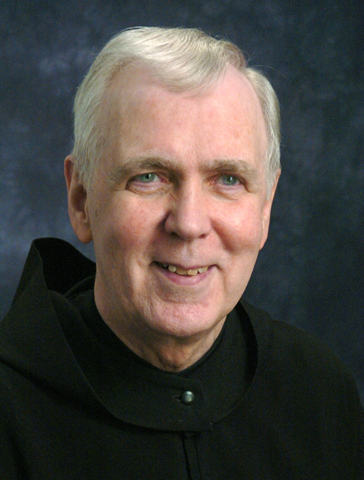
Benedictine Fr. R. Kevin Seasoltz, former rector of St. John's Seminary in Collegeville, Minn., and a noted liturgist and author, died April 27 at age 82 after a brief battle with cancer. (CNS/St. John's Abbey)
Benedictine Fr. R. Kevin Seasoltz, former rector of St. John's Seminary in Collegeville and a noted liturgist and author, died Saturday in the retirement center on the Benedictine Abbey grounds after a brief battle with cancer. He was 82.
A funeral Mass was scheduled for Thursday at the abbey chapel, with burial following at the monastic cemetery.
Seasoltz was rector of the Benedictine seminary at Collegeville from 1988 to 1992. He served as a theology professor there from 1972 to 2008, originally only during the summer until 1987, and then on a full-time basis for 20 years before retiring. Prior to teaching at Collegeville full time, he was on the faculty of The Catholic University of America in Washington for 25 years.
Born Robert Joseph Seasoltz in Johnstown, Pa., Dec. 29, 1930, Seasoltz was ordained a priest in 1956 for his home diocese of Altoona-Johnstown. However, drawn to the monastic lifestyle, he professed his first vows as a Benedictine monk in 1960, taking the name Kevin.
He won a Catholic Press Association book award for best book on liturgy in 2006 with "A Sense of the Sacred: Theological Foundations of Christian Architecture and Art."
Seasoltz's latest book, published in 2012, is "A Virtuous Church: Catholic Theology, Ethics, and Liturgy for the 21st Century."
Other books he authored include "Translating Tradition: A Chant Historian Reads 'Liturgiam Authenticam'" (2005); "New Liturgy, New Laws" (1986); "Living Bread, Saving Cup: Readings on the Eucharist" (1982); "The New Liturgy: A Documentation, 1903-1965" (1966); and "The House of God: Sacred Art and Church Architecture" (1963).
Seasoltz's work was widely quoted by other liturgical scholars in their own writings.
In addition to his writing, Seasoltz had been editor of the liturgical journal Worship since 1987.
At the 1990 meeting of the Conference of Major Superiors of Men in Newport, R.I., Seasoltz said there was little doubt the vow of obedience "collides with many of the values most highly prized by many Americans, including many religious."
He said that "Christian obedience is basically a response to Christ's paschal call to die to self-preoccupation and self-centeredness, to lay down one's life for God and others."
The profession of religious obedience at the present time, Seasoltz said, "calls us to grow in Christian freedom understood not as the ability to do simply what we want to do but rather to be and become what we ought to be."
In 2005, he was the recipient of the Berakah Award from the North American Academy of Liturgy, and in 2009, he received the Frederick McManus Award from the Federation of Diocesan Liturgical Commissions.
Seasoltz is survived by a brother and two nieces.


